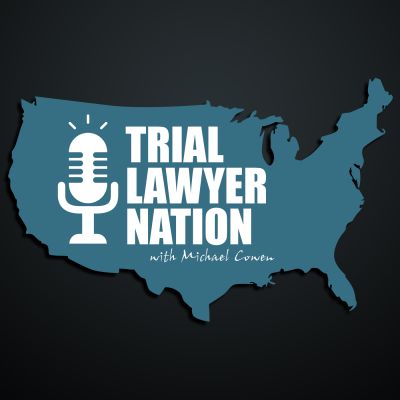Michael Cowen, and his guests, explore critical topics distinctive to the legal profession - specifically focusing on developing extremely efficient law practices, securing a competitive edge in the industry, and wildly excelling in the courtroom.
https://triallawyernation.com/
62 – John Campbell – The Empirical Jury: Big Data with Big Results
In this episode of Trial Lawyer Nation, Michael is joined by attorney, law professor, and founder of Empirical Jury, John Campbell. They sit down for a conversation about big data for trial lawyers, what John’s company “Empirical Jury” does, legal “urban legends” and their validity (or lack thereof), the most interesting findings he has discovered working on specific cases, and an in-depth look at the effects of COVID-19 on jury attitudes.
The episode starts off with Michael asking John how he got into the field of jury research. John describes his path of starting out as a teacher and deciding to go back to school to become a lawyer. He then joined Denver Law School as a professor studying tort reform in an academic setting, founded the Denver Empirical Justice Institute, and discovered his passion for big data. There, he studied civil justice issues and how jurors behave, but wondered if he could apply scientific methods and big data to law based on an individual case. Basically, he wanted to know what would happen if he had 400 people look at a case instead of the traditional 10-15 people you get with a focus group.
Thus, Empirical Jury was born. John describes the process as working like a “gig economy.” He will share an ad along the lines of, “be a mock juror and get paid to do it,” and is able to recruit hundreds of workers in one day. The work is all done online in their own time, and costs much less per juror than a traditional focus group. With numbers like that, Michael asks what everyone must be thinking – how representative can your jury pool be? Are the respondents all underemployed young people? John says it’s more representative than you’d think. He explains how many people take online surveys for fun, like playing Sudoku. His participants range between 18-80 years old, very conservative to very liberal, and typically earn up to $150,000 a year.
Michael then inquires about the many “urban legends” of law applied to jurors, specifically are any of them true? The short answer is no, but John dives into some surprising details. The moral of the story is to avoid stereotyping based on factors like race or gender, but to instead focus heavily on their responses to bias questions. A juror who believes the burden of proof is too low for the plaintiff’s lawyer being placed on the jury can have detrimental effects on the outcome of the case.
John goes on to share some of his most interesting findings. The first addresses the idea that if you ask for more, you get more. He has found this to be true based on the anchoring principle, with an interesting caveat – the amount you ask for directly affects liability. Typically, the liability climbs the more you ask for until you hit “the cliff.” He shares a shocking example of this in practice and concludes with, “You’re your own damage cap.”
The conversation shifts to the highly debated topic of COVID-19 and its effects on jury attitudes. John has conducted extensive research on this topic, including a survey of 1,500 jurors asking questions about COVID-19 and trial options. He lists a number of shocking statistics and concludes that to seat a jury today you would have to account for a loss of 50% of jurors before asking a single voir dire question not related to COVID-19. Knowing this information, another vital question remains – do the remaining 50% of jurors skew towards the defense or the plaintiff? John explains how the answer is more complicated than most people think, but goes on to share some in-depth findings which have huge implications for the future of jury trials.
John continues by describing another study he conducted where he asked 1,200 jurors how they would prefer to participate in a jury, including a variety of in-person and virtual options. The respondents had a surprising favorite – the option to watch the case via video recording from home, on their own time. While this may sound far-fetched,
